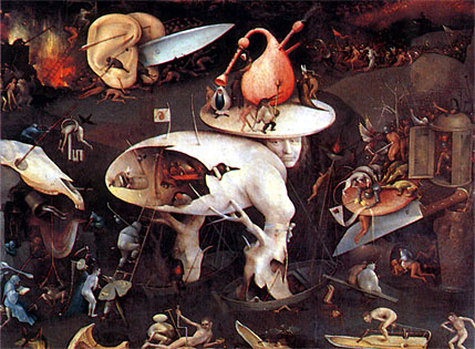
Bell's book has sparked a lot of controversy, I'm inclined to believe, that is a good thing. Bell is an interesting guy, with a fresh perspective and he is in some ways, better historically informed and certainly more inquisitive than most of the brethren. He rightly questions the Church's traditional view of Hell, (thank God for that)—and the meaning of salvation. I am not saying I agree with his ultimate conclusion. On the other hand I completely reject the tradition that first emerged after Augustine and was perverted through the long dark night of the Church of Rome, following the collapse of the Roman Empire, continuing into the Dark ages, the Black plague, the rise and fall of various European powers….etc.
The Reformation, (Luther, Calvin) essentially reclaimed Augustine’s interpretation—and that has been the official position of the Church ever since, with the writing of Dante and the paintings of Bosch as the emotional framework and the visual cue giving weight to their imagination.
It was in that period, from about three hundred years after Jesus, through the Reformation, that our vision of Hell and Heaven was formed, as were most of the other dogmas' that are the basis of our doctrine. A kind of snaggle toothed evolution, more closely resembling a modern congressional district, than God directed, the ever present problem of politicians and priests!
The enlightenment began a period of reclaiming the philosophical and intellectual culture of the Greeks, leading to the rebuilding of Europe, leaving The Church scrambling to keep up.
And so the mainstream of Christian tradition moves forward against the intellectual tide, haughty in our ignorance and dogmatic in our faith—demanding that the non-Christian world conform to our way of life, with America, the new Israel leading the way—on the hunt for Pharisees and heretics, spreading the Gospel one vote at a time. Never looking in the mirror long enough to reflect on the possibility that we might be wrong.
Mark Magula
The Reformation, (Luther, Calvin) essentially reclaimed Augustine’s interpretation—and that has been the official position of the Church ever since, with the writing of Dante and the paintings of Bosch as the emotional framework and the visual cue giving weight to their imagination.
It was in that period, from about three hundred years after Jesus, through the Reformation, that our vision of Hell and Heaven was formed, as were most of the other dogmas' that are the basis of our doctrine. A kind of snaggle toothed evolution, more closely resembling a modern congressional district, than God directed, the ever present problem of politicians and priests!
The enlightenment began a period of reclaiming the philosophical and intellectual culture of the Greeks, leading to the rebuilding of Europe, leaving The Church scrambling to keep up.
And so the mainstream of Christian tradition moves forward against the intellectual tide, haughty in our ignorance and dogmatic in our faith—demanding that the non-Christian world conform to our way of life, with America, the new Israel leading the way—on the hunt for Pharisees and heretics, spreading the Gospel one vote at a time. Never looking in the mirror long enough to reflect on the possibility that we might be wrong.
Mark Magula
 RSS Feed
RSS Feed